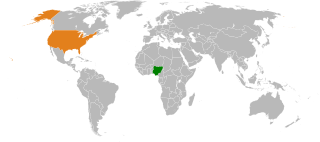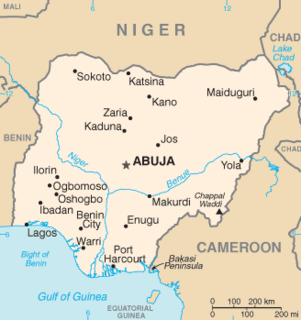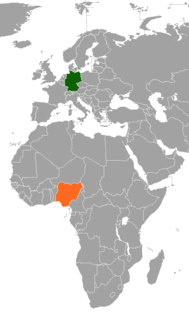Related Research Articles

The Peoples Democratic Party is one of the two major contemporary political parties in Nigeria, along with its main rival, the All Progressives Congress.

The President of the Federal Republic of Nigeria is the head of state and head of government of the Federal Republic of Nigeria. The President of Nigeria is also the commander-in-chief of the Nigerian Armed Forces. The president is elected in national elections which take place every four years. The offices, powers, and titles of the head of state and the head of government were officially merged into the office of the presidency under the 1979 Constitution of Nigeria. The current president, Muhammadu Buhari, took office on 29 May 2015, as the 15th president of the Federal Republic of Nigeria.

Energy policy is the manner in which a given entity has decided to address issues of energy development including energy conversion, distribution and use as well as reduction of greenhouse gas emissions in order to contribute to climate change mitigation. The attributes of energy policy may include legislation, international treaties, incentives to investment, guidelines for energy conservation, taxation and other public policy techniques. Energy is a core component of modern economies. A functioning economy requires not only labor and capital but also energy, for manufacturing processes, transportation, communication, agriculture, and more. Energy planning is more detailed than energy policy.

The Ministry of Trade, Industry and Energy (MOTIE) is a ministry under the Government of South Korea. It is concerned with regulating some economic policy, especially with regard to the industrial and energy sectors. The ministry also works to encourage foreign investment in Korea. The current minister is Lee Chang-yang.

REN21 is a think tank and a multistakeholder governance group which is focused on renewable energy policy.
Edmund Maduabebe Daukoru is a former Nigerian Minister of State for Energy and was Secretary General of the Organization of the Petroleum Exporting Countries (OPEC) in 2006. He became the Amayanabo, or traditional ruler, of Nembe Kingdom in 2008. Also Chairman of South South Monarchs forum in the PGEJ regime.

Corruption is an anti-social attitude awarding improper privileges contrary to legal and moral norms and impairs the authorities' capacity to secure the welfare of all citizens. Corruption in Nigeria is a constant phenomenon. In 2012, Nigeria was estimated to have lost over $400 billion to corruption since its independence. In 2021, the country ranked 154th in the 180 countries listed in Transparency International's Corruption Index.

The San Gorgonio Pass wind farm is a wind farm that stretches from the eastern slope of the San Gorgonio Pass, near Cabazon, to North Palm Springs, on the western end of the Coachella Valley, in Riverside County, California. Flanked by Mount San Gorgonio and the Transverse Ranges to the North, and Mount San Jacinto and the Peninsular Ranges to the South, the San Gorgonio Pass is a transitional zone from a Mediterranean climate west of the pass, to a Desert climate east of the pass. This makes the pass area one of the most consistently windy places in the United States.

Bilateral relations between the Federal Republic of Nigeria and the United States of America were formally inaugurated when Nigeria attained its independence from Britain in 1960. In the 21st century, they have entailed an important, if occasionally uneasy, alliance, following a more chequered diplomatic past. Nigeria has traditionally been among the United States's most important partners in Africa, and together the countries' populations account for more than half a billion people.
Abraham Babalola Borishade was a Nigerian politician. He was a four time Federal Minister in Nigeria, between 1999-2011. He was known as an electrical engineer, teacher and political strategist.

The Federal Ministry of Science & Technology is a Nigerian ministry whose mission is to facilitate the development and deployment of science and technology apparatus to enhance the pace of socio-economic development of the country through appropriate technological inputs into productive activities in the nation. It is headed by a Minister appointed by the President, assisted by a Permanent Secretary, who is a career civil servant. President Muhammadu Buhari, GCFR on 11 November 2015 swore in Dr. Ogbonnaya Onu as the Minister of Science and Technology with Dr.(Mrs) Amina Muhammed Bello Shamaki as the permanent secretary in the ministry.
Nigerian Electricity Regulatory Commission(NERC) is an independent regulatory body with authority for the regulation of the electric power industry in Nigeria. NERC was formed in 2005 under the Obasanjo administration’s economic reform agenda through the Electric Power Sector Reform Act, 2005 for formation and review of electricity tariffs, transparent policies regarding subsidies, promotion of policies that are efficient and environmentally friendly, and also including forming and enforcing of standards in the creation and use of electricity in Nigeria. NERC was instituted primarily to regulate the tariff of Power Generating companies owned or controlled by the government, and any other generating company which has a licence for power generation and transmission of energy, and distribution of electricity.

In 2011, the Nigeria's primary energy consumption was about 108 Mtoe. Most of the energy comes from traditional biomass and waste, which account for 83% of total primary production. The rest is from fossil fuels (16%) and hydropower (1%).

The Energiewende is the ongoing transition by Germany to a low carbon, environmentally sound, reliable, and affordable energy supply. The new system intends to rely heavily on renewable energy, energy efficiency, and energy demand management. The last nuclear power plant will shut down in 2022, all existing coal-fired generation will be retired by 2038. Legislative support for the Energiewende was passed in late 2010 and included greenhouse gas (GHG) reductions of 80–95% by 2050 and a renewable energy target of 60% by 2050.

The energy transition is the ongoing process of replacing fossil fuels with low carbon energy sources. More generally, an energy transition is a significant structural change in an energy system regarding supply and consumption.

Renewable energy in Armenia ranges from geothermal, hydroelectric, solar and wind energy in Armenia.
The Rivers State Ministry of Power is a government ministry of Rivers State, Nigeria created in July 1999 to serve as the policy-formulating and implementing body for the state's electrical energy and power sector. The ministry's mission is to "ensure that Rivers State meets its energy needs through a sustainable framework that will support the state’s economic growth and provide its citizenry with services that meets their expectations as a fast growing economy". The ministry is headed by the Commissioner of Power, currently Augustine Wokocha.
National Environmental Standards and Regulations Enforcement Agency is an environmental agency of the Federal Government of Nigeria that was established by law in 2007 to "ensure a cleaner and healthier environment for Nigerians". The agency function as a parastatal of the Federal Ministry of Environment (Nigeria), and is headed by a Director General who is also the chief executive officer with about 483 companies in the NESREA corporate family Negative human activities that have effects on the environment are covered by NESREA's 33 National Environmental Regulations. Their mandate includes process and equipment monitoring, compliance with set standards, disciplining violators of set rules, conducting public investigations, and proposal submission to the minister for review in order to maintain environmental quality.
Green recovery packages are proposed environmental, regulatory and fiscal reforms to build prosperity in the wake of an economic crisis, like the COVID-19 pandemic or the Global Financial Crisis. They pertain to fiscal measures that intend to recover economic growth while also positively benefitting the environment, including measures for renewable energy, efficient energy use, nature based solutions, sustainable transport, green innovation and green jobs, amongst others.

Germany-Nigeria relations refers to the bilateral relations between the Federal Republic of Germany and Federal Republic of Nigeria. Nigeria operates a Embassy in Berlin and Germany operates a Embassy in Abuja. Germany has a Consulate-General in Lagos and Nigeria has a Consulate-General in Bonn.
References
- ↑ Nigeria National Energy Policy, World Resources Institute
- ↑ "Aiding Nigeria's energy transition ― through natural gas, By Ehireme Uddin - Premium Times Nigeria". 2022-05-06. Retrieved 2022-07-05.